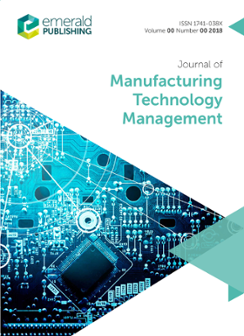Drivers of green supply chain integration and green product innovation: a motivation-opportunity-ability framework and a dynamic capabilities perspective
IF 7.3
2区 工程技术
Q1 ENGINEERING, INDUSTRIAL
引用次数: 5
Abstract
PurposeThis study provides an integrative model that facilitates green product innovation (GPI) by adopting dynamic capabilities theory and the motivation-opportunity-ability (MOA) framework. Drawing on dynamic capabilities theory, this study emphasizes green supply chain integration (GSCI), consisting of internal and external integration, as a dynamic capability that drives GPI. Moreover, this study analyzes the environmental conditions that benefit the development of dynamic capabilities using the MOA framework and focuses specifically on government support (GS) and market greenness (MG) as precursors to GSCI.Design/methodology/approachSurvey data were collected from 300 Chinese manufacturing firms. The proposed hypotheses were tested using hierarchical multiple regression analysis.FindingsThe regression analysis reveals that (1) GS and MG positively affect both internal and external integration and (2) internal and external integration positively affect GPI.Originality/valueIn explicating a model of GPI, this study extends the theoretical lens of dynamic capabilities beyond the intraorganizational level to the supply chain level. Moreover, this study enhances the understanding of dynamic capability development by considering the environmental conditions that represent motivation- and opportunity-based drivers of GSCI.绿色供应链整合与绿色产品创新驱动因素:动机-机会-能力框架与动态能力视角
目的本研究采用动态能力理论和动机-机会-能力框架,提供了一个促进绿色产品创新的综合模型。本研究借鉴动态能力理论,强调绿色供应链整合(GSCI)是一种驱动GPI的动态能力,包括内部和外部整合。此外,本研究使用MOA框架分析了有利于动态能力发展的环境条件,并特别关注作为GSCI前兆的政府支持(GS)和市场绿色性(MG)。设计/方法/方法从300家中国制造企业收集了调查数据。采用分层多元回归分析对提出的假设进行了检验。结果回归分析表明:(1)GS和MG对内部和外部整合都有积极影响;(2)内部和外部集成对GPI有积极影响。原始性/价值在解释GPI模型时,本研究将动态能力的理论视角从组织内层面扩展到了供应链层面。此外,本研究通过考虑代表基于动机和机会的GSCI驱动因素的环境条件,增强了对动态能力发展的理解。
本文章由计算机程序翻译,如有差异,请以英文原文为准。
求助全文
约1分钟内获得全文
求助全文
来源期刊

Journal of Manufacturing Technology Management
Engineering-Control and Systems Engineering
CiteScore
16.30
自引率
7.90%
发文量
45
期刊介绍:
The Journal of Manufacturing Technology Management (JMTM) aspires to be the premier destination for impactful manufacturing-related research. JMTM provides comprehensive international coverage of topics pertaining to the management of manufacturing technology, focusing on bridging theoretical advancements with practical applications to enhance manufacturing practices.
JMTM seeks articles grounded in empirical evidence, such as surveys, case studies, and action research, to ensure relevance and applicability. All submissions should include a thorough literature review to contextualize the study within the field and clearly demonstrate how the research contributes significantly and originally by comparing and contrasting its findings with existing knowledge. Articles should directly address management of manufacturing technology and offer insights with broad applicability.
 求助内容:
求助内容: 应助结果提醒方式:
应助结果提醒方式:


